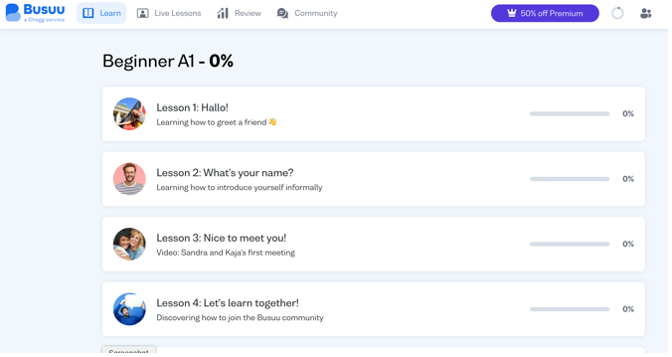Busuu vs Duolingo: Which is the best free app?
Congratulations, you made it! You took the first step on your language learning journey. Now, it's time to stop studying how to study language and actually start learning it!
So, Busuu or Duolingo? In short, it depends on you, your goals, your budget, and your favorite learning methods. If price is your main concern, Duolingo is your best choice. If you value feedback from natives, Busuu is the one to pick. If you're just casually testing the waters, then choose Duolingo. If you're more serious about language learning and value a more academic approach, then choose Busuu.
I'm a language nerd, so I've actually tried both apps. Moreover, I ran the trials first as a professional linguist and then as a student - to arrive at an all-around solution. By following our analysis of these two language learning apps, you'll be able to make up your mind, based on what you're looking for and the type of person you are. This is important because each person is different and should look for the methods that favor them so that they don't burn out after two months of learning a new language.
Language learning apps are a nice alternative to language courses that require you to take classes in a brick-and-mortar location with other learners at an agreed-upon time. Apps allow you to be spontaneous and mobile. If you have a smartphone, you’re perfectly equipped to take lessons anytime and anywhere. Also, keep in mind that it's better to practice for 10-15 minutes every day than to do it for five hours a day and then take three days off.
So now, without further ado, check out our review and make up your mind.
Disclaimer: This text doesn't aim to either advertise or criticize one language app or the other. Its purpose is to provide you with a comparison – Busuu vs Duolingo – so that you can make an informed choice.
Busuu and Duolingo Review
Busuu and Duolingo are the most popular language learning apps. They're accessible globally: you can use them regardless of whether you're the Prince of Denmark or an employee at McDonald’s. The following key features are characteristic of both Duolingo and Busuu and add to their appeal:
- Affordability (you can choose between free plans and fairly affordable plans)
- Flexibility (you can download them as apps or desktop versions, with complete lessons on the go)
- A mix of education and entertainment (you get the feeling you’re playing a game rather than learning languages)
Whichever app you pick, you will enjoy the following benefits:
- Materials grouped in lessons that revolve around a certain topic
- A pool of exercises like fill in the blanks, multiple choice, type what you hear, etc.
- Exercises with all major skills: reading, listening, writing, and speaking
If you're new to the whole language learning app culture, you’ll most probably find any available app equally enjoyable, at first. But if like me, you've had some experience with languages or studied languages professionally (here you have a proud speaker of six languages), you might have second thoughts. I realize that the pool of modern language apps is so large one might easily drown. To help you out, I've run a test trial of Busuu vs Duolingo. Well, actually, two trials: one as a professional German speaker (learning German on both) and another one as an intermediate Spanish speaker (learning Spanish on both). In this article, you'll find the conclusions that I was able to draw from my experience.
Before we proceed, here's a short overview of Busuu vs Duolingo:
What is Duolingo?

Duolingo is the most popular language learning app that was created in the U.S. in 2009. Over the years, it has grown to offer 38 languages to its 300 million users. What are the obvious pros of this app?
- A vast choice of languages (the largest number on the market)
- A solid free, basic plan (you don’t even need to move to the paid plan)
- Game-like, intuitive interface
- Great additional materials (podcasts, Zoom talks, and a dictionary)
Are there any obvious cons? Unfortunately, yes:
- Bugs in the speech recognition system
- Lack of skill validation (no certificate for users)
What is Busuu?

Busuu, an obvious competitor of Duolingo, was created in Spain in 2008 and now enjoys a user base of more than 100 million language learners, making it second in popularity. What are Busuu’s biggest pros?
- Feedback from native speakers (you have access to the Busuu community)
- Possibility of certification at the end of the Premium Plus program
- A structured, academic approach
- An emphasis on real-life situations (useful scenarios and contemporary words and phrases)
What about its cons?
- A very limited free plan (you will need to get upgraded)
- The need to wait for feedback (no automated feedback on your work)
If this overview is sufficient, get the Duolingo or Busuu app right away. If not, keep reading.
FAQ: Is Busuu worth the money?
The Busuu app is worth the money. Even the premium subscription is worthwhile if you're determined to learn a new language. Busuu is great in that it covers beginner and intermediate levels. One of its best features is its strong social aspect - an online native speaker community that engages with Busuu users. Language learners practice speaking, writing, and reading and receive valuable feedback from people who speak the users' target language as their native language.
Busuu vs Duolingo! Fight!
Pricing - Winner: Duolingo
The apps under discussion are not unique in terms of pricing. The plans for both are competitive with other language online tools out there – like Babbel, Rosetta Stone, etc. – and range between $6 and $12 a month.
- Busuu offers three plans: Basic, Premium, and Premium Plus
- Duolingo offers only two plans: Basic and Plus
Suppose that you subscribe for 12 or 24 months upfront; their cost will be similar. Busuu would be slightly pricier on a month-to-month basis, namely 7$ versus $12.
The pricing and plan options are Duolingo's biggest advantages. I honestly don’t even see the necessity for a paid Duolingo subscription. No, seriously: the developers offer us most stuff for free. So, just stick to the basic plan unless you need the following perks:
- No ads (we’re kind of used to them anyway)
- Offline lessons (a rather useless bonus unless you’re moving to a desert island)
- Skipping lessons (I’d personally ignore everything difficult - so no, thanks)
- Taking a mastery quiz to track your course completion (well, is that so important?)
Busuu is far thriftier with its free features. Here, the recommendation is the opposite: unless you consider upgrading to Premium Plus forget about this language course altogether. Honestly, you’ll have access to too few things with only the free option.
In any case, both language apps offer a free trial period and a money-back guarantee. And I’d highly recommend using it. Don’t buy something you haven’t tried personally. What is ideal for my preferences, pace, and needs might turn out to be a disaster for you and vice versa. You should make your own informed decision.
Verdict: Based on the price, Duolingo wins a landslide victory.
Language Options - Winner: Duolingo
We should have probably started with this one. What language are you going to learn? For people like me, who learn Spanish or Polish, that’s one thing. But if you have a curious mind and want to study Korean or Swahili, Busuu won't enter the equation.
Here’s a major distinction: Duolingo offers 38 languages, while Busuu only has 13. Users praise Duolingo for providing a compatible representation of non-popular languages and teaching them along with the popular ones.
Verdict: If you’re on my team in terms of foreign language choice, this factor won't influence us. If you want to study exotic languages – go with Duolingo.
Lesson Structure and Style - Winner: Tie
At first sight, Duolingo and Busuu might seem similar - they both look colorful and fun and the navigation is super intuitive, which allows you to just sign up and start learning in 20 seconds.


Using both apps, you’ll notice the following common features immediately:
- Lessons are 5-15-minute long (they don’t want to tire you and scare you off)
- You can pick the frequency and intensity of your lessons (e.g., 30 minutes on Mondays and Wednesdays)
- You can save your progress (preventing you from having to start over the next time you log in)
What about their differences?
- Busuu is more structured in every sense of the word. When Busuu offers you a grammar topic, it will force you to use it in various contexts. If you study "family", you will learn numerous new words and practice exercises using those different words.
- Duolingo sometimes seems to have an everything-goes attitude (which might work for you, if you get bored easily). That’s the thing with Duolingo. It resembles an academic environment as little as possible, intentionally gamifying the lessons to make them short and fun. Duolingo even offers leaderboards for friendly competition.
- Duolingo is more automated than Busuu. This is one of the key distinctions you should consider based on your personality. Duolingo has a special speech recognition system: you are required to repeat a word or produce a phrase for the tool to either approve or disapprove it. Now, while this might sound innovative and handy, the machine occasionally malfunctions, which can be frustrating - the software might, every now and then, approve a butchered word and refuse to pass a perfectly pronounced one.
- The Busuu developers opted for a different feedback feature, whether it was for being too lazy to design an automated tool or foreseeing the problems Duolingo now faces with the AI system. Busuu Premium encourages you to be social: at the end of a lesson, you can produce a voiceover or read a text, upload the recording into the system and wait for a community member (native speaker) to provide you with feedback. Now, this option can be a double-edged sword, especially if you're shy. The other thing is the waiting time. You never know when a native speaker will feel like providing you with their comments. What are you supposed to do while you wait? Should you move on to another topic or wait for the feedback?


Verdict: If you're a fan of an academic approach and real-people feedback, go with Busuu; if you approach language learning like Minecraft, pick Duolingo.
Vocabulary and Grammar - Winner: Busuu
Both apps cover reading, writing, listening, and speaking skills, albeit to different extents and from distinct angles. You would hardly disagree with the fact that vocabulary and grammar are the building blocks of any language. Duolingo and Busuu seem to agree. What are the key distinctions in their m.o. here?
Vocabulary
- Busuu selects its topics and vocabulary with a view to most typical social situations. You'll be learning certain words, reading texts, and watching videos with language scenarios you are highly likely to get into yourself, such as booking a hotel room, hearing a train delay announcement, etc.
- Duolingo does the same with its Short Story feature and Podcast. Duolingo is also the one that wins in terms of vocabulary. It provides you with more exercises where you can repeat the words learned, and it offers more words to learn.
- Busuu offers great conversation simulation exercises: you listen to native speakers holding a conversation and fill in the gaps. It's done on the spot and requires your concentration. This is highly effective when practicing your listening and comprehension skills and learning new vocabulary.
- Duolingo has the additional feature of Events – a personal favorite of mine – where you can register to participate in real conversations with other users via Zoom. Well, that’s Duolingo's social feature that competes with Busuu’s community feedback and extra live lessons. As an experienced teacher and language enthusiast, I’m a big proponent of practice aimed at developing speaking and writing skills. These productive activities are 10 times more effective than reading and listening.


Verdict: While many users praise Busuu for its choice of topics and nice teaching videos, Duolingo leads with the pool of phrases and extra materials. This is the area where I’d like to blend the two apps – you’d benefit from Busuu’s video clips and topic choice paired with Duolingo’s Zoom and podcast solutions.
Grammar
We all kind of hate grammar, don’t we? Developers of language apps are perfectly aware of this attitude, so they try to make grammar as unnoticeable as possible in the course.
- Duolingo masks this aspect more effectively – you practice grammar, but it isn’t made explicit. You just do writing exercises where you fill in articles in German or place a verb in a proper tense form in a Spanish course. You are not bombarded with grammar explanations though.
- Busuu, in turn, offers cute, brief grammar descriptions. And honestly, I appreciate them. You have a contextual explanation followed by a few exercises. It doesn’t tire you out but serves as a great teaching point. Busuu also blends vocabulary and grammar lessons nicely, giving you a chance to practice both at once in a real life-like situation. This contextual nature with focus on the native culture is perhaps the strongest advantage of Busuu lessons.
Busuu: Grammar explanations

Verdict: Pick Busuu if you want to focus on grammar rules. With Duolingo, you’ll likely find yourself googling grammar rules so you're able to complete some exercises.
FAQ: What's special about Duolingo?
In essence, the language learning process on Duolingo is similar to that of any other language learning app. It teaches a target language focused on reading, writing, listening, and speaking skills and offers courses in a game-like format. What's special with Duolingo is its very substantial free-of-charge plan, availability of multiple languages, and an abundance of additional features, like Events on Zoom.
Stand out Features - Winner: Tie
Now, what's unique about Busuu?
- CEFR certificate. While you can use Duolingo for your own benefit, you won’t be able to prove your achievement on paper. Busuu claims to follow the CEFR certification guide and even issues you a (kind of) official language certificate after you’ve completed the chosen course and passed the final test. This is only possible if you choose the Premium Plus (a.k.a.: the priciest) plan, though.
- Intermediate materials. You might want to use a language learning app either to try a new language or to deepen your knowledge of the languages you already speak. In the latter case, you'll need to take a placement test. Both Busuu and Duolingo provide it, but the categorization gets tricky upon B1 (pre-intermediate level) in Duolingo. It seems Duolingo doesn’t offer appropriate language courses beyond the pre-intermediate level, but the app doesn’t want to lose a user. So, it will keep you in B1, where you’ll become bored after a few too many easy lessons. I've found Busuu more substantial. You'll still have fun if you’re at the B2.1 level (intermediate).
And what's unique about Duolingo?
- Speech recognition system. Having access to immediate feedback on your speaking ability is an obvious benefit. While Duolingo’s system is often criticized for its bugs, it works fine in most cases and may be seen as one of the app’s biggest strengths.
- Leaderboard. It might sound silly to some, but many people are competitive and approach a language learning app like a game. Competing against other users in the course boosts your (albeit external) motivation and adds to the discipline. It’s helpful and fun.
Verdict: This one balances at 50% - 50%. If you're beyond the beginner’s level with a language – go with Busuu. You’ll appreciate more complex materials and validation of your language skills. If you're just starting your language journey – Duolingo has you better covered.
FAQ: Is Busuu's certificate valuable?
If you're going to get Busuu Premium solely for the sake of an official language level certificate, don't. While you can use the final test results to demonstrate your command of a new language on LinkedIn or on your CV, it's only half official. In addition, the Busuu free plan offers too few features, so you'll most likely upgrade your plan anyway. In this case, the CEFR certificate at the end of your language course will serve as a token of your effort.
So, Which One: Busuu or Duolingo?
We've arrived at a point when it's time to make it official: Busuu or Duolingo? What do I like about both?
- Their social component (Duolingo Events and Busuu community)
- The "write what you hear" exercises (providing a nice drill for your comprehension skills)
What do I dislike about both Busuu and Duolingo?
- Too much emphasis on translation into English (I’d appreciate more of the target language immersion)
- Scant opportunity to grow beyond an intermediate level
Do you want the final verdict?
Use Busuu if you are looking for:
- More structured, logical, and standard lessons
- Access to a CEFR certificate as part of Busuu Premium Plus
- Stronger social aspect through native speakers’ feedback
- More emphasis on grammar and listening skills
- Contextual vocabulary and everyday life situations
Opt for Duolingo if you want:
- A decent free plan without a need to upgrade it
- Immediate automated pronunciation feedback
- Free perks and additional resources
- A focus on repetition and practice exercises
- The flair for competition and informal lesson format
Last but not least, if you think a language app alone can perform a miracle and teach you speaking, writing, listening, and reading skills in no time, forget about it. In the words of our follower Anna Eckslager (about Duolingo), “It's not my primary mode of learning, and I think that's an important aspect with language learning Apps. I wouldn't recommend it as a solitary tool to learn; it's missing grammar and proper explanations”.
If you realize that you pick Busuu or Duolingo (or any other app for that matter) as a starting point or as a useful replacement for your smartphone Tetris, choose one based on our descriptions. We analyzed all the pros and cons of the available language learning apps so that we can offer a great alternative. While we're still working on the Flying Languages platform, it already has some wonderful features. You’ll be impressed by how many free learning videos with natives we provide, how insightful our educational articles are, and how user friendly and individually tailored your learning experience is made. Keep Flying Languages in mind if you've been disappointed by some of the existing apps. We intend to get it just right for you and other language enthusiasts.


